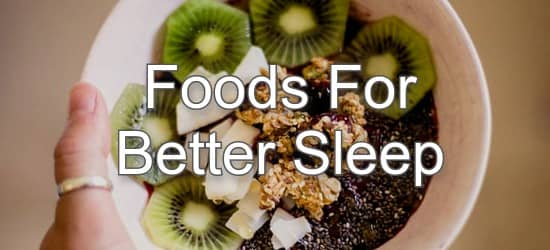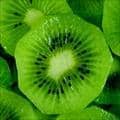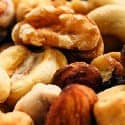Top 10 Foods For Better Sleep

According to the National Sleep Foundation, one in three people suffer from sleep problems at some point in their lives.
Sleep is just as important as healthy eating and exercise for both physical and mental health. Lack of sleep can contribute to depression, anxiety, stress, weakened immune system (1), weight gain (2), skin aging (3), relationship problems, and an increased risk of heart disease and diabetes (1).
Busy lifestyles, however, often mean that getting enough sleep falls down the list of priorities while trying to fit in everything else life demands of us. Furthermore, features of modern life including high stress levels, artificial lighting, and technology use can all disrupt sleep.
The good news is that everyone is born with the natural ability to sleep, so if you're not sleeping well, it means something is getting in the way of your body's natural ability. Identifying and removing the cause(s) should therefore restore good quality sleep. The benefits of doing so will include improved mood, reduced disease risk, improved brain function, memory and concentration, more energy, helping appetite and weight control, and slowing down the aging process.
The following foods may also help, as they have sleep promoting effects. If eaten regularly, as part of a healthy diet and lifestyle, along with good sleep hygiene (see tips below) and genuinely making sleep a priority, they can help encourage a restful night's sleep.
Foods to Eat for Better Sleep
-
 1. Soya Foods + Add
Soya is a top dietary source of tryptophan, from which serotonin is manufactured, which in turn, is converted into the 'sleep hormone' melatonin. (4) Melatonin is released by the brain as it gets dark to induce sleep, so including foods that are high in tryptophan will ensure your body has the building blocks to produce it. One study found that consuming tryptophan-enriched cereal for 3 weeks improved sleep duration and quality in middle-aged and elderly adults. (5) Other good sources of tryptophan include nuts, seeds, chicken, turkey, fish, beans and eggs.
1. Soya Foods + Add
Soya is a top dietary source of tryptophan, from which serotonin is manufactured, which in turn, is converted into the 'sleep hormone' melatonin. (4) Melatonin is released by the brain as it gets dark to induce sleep, so including foods that are high in tryptophan will ensure your body has the building blocks to produce it. One study found that consuming tryptophan-enriched cereal for 3 weeks improved sleep duration and quality in middle-aged and elderly adults. (5) Other good sources of tryptophan include nuts, seeds, chicken, turkey, fish, beans and eggs.
Nutrition Facts for Boiled Soybeans (Edamame). -
 2. Tart Cherries + Add
Tart Cherries contain small amounts of the 'sleep hormone' melatonin and research suggests that they can improve sleep duration and quality (6). One study found that drinking concentrated tart cherry juice for 7 days raised melatonin levels and increased time in bed, total sleep time, and sleep efficiency. (7) Another study found similar benefits, along with reduced night awakenings and less movement during the night. Further, the benefits increased with advancing age. (8)
2. Tart Cherries + Add
Tart Cherries contain small amounts of the 'sleep hormone' melatonin and research suggests that they can improve sleep duration and quality (6). One study found that drinking concentrated tart cherry juice for 7 days raised melatonin levels and increased time in bed, total sleep time, and sleep efficiency. (7) Another study found similar benefits, along with reduced night awakenings and less movement during the night. Further, the benefits increased with advancing age. (8)
Nutrition Facts for Frozen Sour Red Cherries. -
 3. Chamomile Tea + Add
Chamomile Tea was traditionally used for centuries as a remedy for anxiety and insomnia, chamomile tea is a soothing evening drink, due to its sedative effects. It contains a substance called apigenin with mild anti-anxiety and sedative properties that bind to the same receptors in the body as sedative drugs, but it is of course, completely natural. (9) One study found that chamomile extract significantly improved sleep quality in elderly people after 28-days (10) and others have shown improvements in anxiety (11), which is often related to sleep problems. Chamomile can also be a safer alternative to benzodiazepine sleeping aids that increase the risk of falls and injuries.
3. Chamomile Tea + Add
Chamomile Tea was traditionally used for centuries as a remedy for anxiety and insomnia, chamomile tea is a soothing evening drink, due to its sedative effects. It contains a substance called apigenin with mild anti-anxiety and sedative properties that bind to the same receptors in the body as sedative drugs, but it is of course, completely natural. (9) One study found that chamomile extract significantly improved sleep quality in elderly people after 28-days (10) and others have shown improvements in anxiety (11), which is often related to sleep problems. Chamomile can also be a safer alternative to benzodiazepine sleeping aids that increase the risk of falls and injuries.
Nutrition Facts for Beverages, tea, herb, brewed, chamomile. -
 4. Spinach + Add
Spinach is a top source of the mineral magnesium that helps calm the nervous system and relaxes muscles. Magnesium supplements for 8 weeks improved symptoms of insomnia in elderly adults, including sleep time, sleep efficiency, and reduced early morning awakenings. (12) Other studies have found benefits of magnesium in combination with other nutrients (melatonin, zinc, B vitamins) for people with insomnia. (13,14) Magnesium can also alleviate periodic limb movements during sleep and restless leg syndrome, both of which disturb sleep. (15)
4. Spinach + Add
Spinach is a top source of the mineral magnesium that helps calm the nervous system and relaxes muscles. Magnesium supplements for 8 weeks improved symptoms of insomnia in elderly adults, including sleep time, sleep efficiency, and reduced early morning awakenings. (12) Other studies have found benefits of magnesium in combination with other nutrients (melatonin, zinc, B vitamins) for people with insomnia. (13,14) Magnesium can also alleviate periodic limb movements during sleep and restless leg syndrome, both of which disturb sleep. (15)
Nutrition Facts for Cooked Spinach (Boiled, Drained). -
 5. Fermented Foods (Sauerkraut, Kimchi) + Add
Sauerkraut, kimchi, and other fermented foods are a top source of probiotics, which have myriad health benefits including improving sleep quality via their actions on improving gut health. A 2021 Korean study found that probiotic supplements for 8 weeks produced significant benefits for sleep and mental health. (16) Another 2021 study found that prebiotics (carbohydrates that feed and stimulate the growth of the good bacteria in the gut) improved sleep quality in 70 adults, aged 35-50 suffering with moderate sleep disturbances. (17)
5. Fermented Foods (Sauerkraut, Kimchi) + Add
Sauerkraut, kimchi, and other fermented foods are a top source of probiotics, which have myriad health benefits including improving sleep quality via their actions on improving gut health. A 2021 Korean study found that probiotic supplements for 8 weeks produced significant benefits for sleep and mental health. (16) Another 2021 study found that prebiotics (carbohydrates that feed and stimulate the growth of the good bacteria in the gut) improved sleep quality in 70 adults, aged 35-50 suffering with moderate sleep disturbances. (17)
Nutrition Facts for Kimchi. -
 6. Kiwifruit + Add
Consumption of kiwifruits before bed appears to enhance the sleep of individuals with self-reported sleep disorders and may also promote sleep in healthy individuals. (18) One study gave subjects aged 20-55 years, 2 kiwifruit an hour before bed for 4 weeks and found improvements in total sleep duration and quality, they also fell asleep more quickly and woke up less in the night. Kiwifruit also have a high serotonin content, which could account for these effects, along with antioxidants and folate, both of which have been associated with benefits relating to sleep. (19)
6. Kiwifruit + Add
Consumption of kiwifruits before bed appears to enhance the sleep of individuals with self-reported sleep disorders and may also promote sleep in healthy individuals. (18) One study gave subjects aged 20-55 years, 2 kiwifruit an hour before bed for 4 weeks and found improvements in total sleep duration and quality, they also fell asleep more quickly and woke up less in the night. Kiwifruit also have a high serotonin content, which could account for these effects, along with antioxidants and folate, both of which have been associated with benefits relating to sleep. (19)
Nutrition Facts for Kiwifruit. -
 7. Oily Fish + Add
Oily Fish provides vitamin D and omega-3 fatty acids, both of which are involved in serotonin regulation and therefore in sleep regulation. One study gave US prison inmates oily fish three times a week for 5 months (over the winter) and reported some improvements in sleep quality and daily functioning. (20) Vitamin D deficiency has been previously linked with poor sleep and supplements have led to improvements.(21,22) Omega-3 fats have also been shown to reduce sleep disturbances in children with clinical sleep problems. (23)
7. Oily Fish + Add
Oily Fish provides vitamin D and omega-3 fatty acids, both of which are involved in serotonin regulation and therefore in sleep regulation. One study gave US prison inmates oily fish three times a week for 5 months (over the winter) and reported some improvements in sleep quality and daily functioning. (20) Vitamin D deficiency has been previously linked with poor sleep and supplements have led to improvements.(21,22) Omega-3 fats have also been shown to reduce sleep disturbances in children with clinical sleep problems. (23)
Nutrition Facts for Cooked Oatmeal. -
 8. Oatmeal + Add
Oats and other complex carbohydrates, such as brown rice, sweet potatoes, wholewheat breads and pastas help raise the body's levels of serotonin. (24) Tryptophan is used to make serotonin and melatonin, the hormone that induces sleep, and eating carbohydrate foods makes tryptophan more available to the brain. Eating an evening meal containing complex carbohydrates combined with protein (to provide the tryptophan) can therefore help induce sleep. Oats also contain some tryptophan and wholegrains, in general, are a good source of magnesium.
8. Oatmeal + Add
Oats and other complex carbohydrates, such as brown rice, sweet potatoes, wholewheat breads and pastas help raise the body's levels of serotonin. (24) Tryptophan is used to make serotonin and melatonin, the hormone that induces sleep, and eating carbohydrate foods makes tryptophan more available to the brain. Eating an evening meal containing complex carbohydrates combined with protein (to provide the tryptophan) can therefore help induce sleep. Oats also contain some tryptophan and wholegrains, in general, are a good source of magnesium.
Nutrition Facts for Cooked Oatmeal. -
 9. Nuts + Add
Nuts, specifically walnuts, contain small quantities of melatonin (25), along with sleep-promoting minerals magnesium and zinc. An Italian study found that magnesium, zinc, and melatonin supplements improved sleep in care home residents suffering with insomnia. (14) Magnesium promotes the release of a neurotransmitter called GABA in the brain (26,27) that calms the nervous system and the mind, reduces thoughts and helps promote sleep. Nuts and seeds are also another top source of tryptophan for melatonin production.
9. Nuts + Add
Nuts, specifically walnuts, contain small quantities of melatonin (25), along with sleep-promoting minerals magnesium and zinc. An Italian study found that magnesium, zinc, and melatonin supplements improved sleep in care home residents suffering with insomnia. (14) Magnesium promotes the release of a neurotransmitter called GABA in the brain (26,27) that calms the nervous system and the mind, reduces thoughts and helps promote sleep. Nuts and seeds are also another top source of tryptophan for melatonin production.
Nutrition Facts for Brazilnuts. -
 10. Malted Milk + Add
A glass of warm milk is a popular night time drink, believed to encourage a good night's sleep. The evidence for regular milk is limited, but it's better for malted milk. (28) Milk is a source of tryptophan and when milk is malted (adding carbohydrate), this raises blood sugar levels, allowing more tryptophan to cross the blood brain barrier and enter the brain. Malted milk is also a source of various vitamins linked with sleep physiology, including vitamins D, B12 and B6. (18) Two small studies in the 1970s observed reduced restlessness and movements during sleep following a night-time drink of malted milk. (29,30)
10. Malted Milk + Add
A glass of warm milk is a popular night time drink, believed to encourage a good night's sleep. The evidence for regular milk is limited, but it's better for malted milk. (28) Milk is a source of tryptophan and when milk is malted (adding carbohydrate), this raises blood sugar levels, allowing more tryptophan to cross the blood brain barrier and enter the brain. Malted milk is also a source of various vitamins linked with sleep physiology, including vitamins D, B12 and B6. (18) Two small studies in the 1970s observed reduced restlessness and movements during sleep following a night-time drink of malted milk. (29,30)
Nutrition Facts for Milk Malted.
Foods To Avoid For Better Sleep
- Caffeine - can take 10-12 hours to be fully metabolised and can suppress melatonin production for up to 10 hours. If you are having severe sleep problems, it is advisable to cut caffeine out completely, otherwise limit yourself to one coffee or two teas, per day, before noon. Alternative hot drinks that promote sleep and relaxation are chamomile, valerian, and sleep formula teas.
- Sugar - can be stimulating, so avoiding refined sugar in the evenings and limiting it in general, can be helpful (31,32). Chocolate contains small amounts of caffeine, another stimulating chemical called theobromine and sugar, so should be avoided in the evenings if you are sensitive. If you wish to indulge in a few squares of dark chocolate, have it as an afternoon snack with some nuts.
- Alcohol - people often resort to a glass of wine to relax and alcohol does temporarily promote the brain-chemical GABA, which makes us feel relaxed. Unfortunately, the effect doesn't last and too much alcohol actually leads to GABA depletion. Furthermore, although alcohol can help you fall asleep, it reduces the quality of sleep, so overall is not helpful.
- Eating Late - eating late or large, heavy evening meals, and difficult to digest foods such as red meat, fried foods, and spicy foods can all disrupt sleep. They can cause indigestion and discomfort that can interfere with sleep, plus eating late means that you won't have digested the food properly before you go to sleep. We should aim to eat dinner at least 3 hours before bed to allow time to fully digest it. If work or other commitments mean eating late, eat more during the day and have a lighter evening meal such as a vegetable soup.
General Tips to Sleep Better
- Regular exercise helps to improve sleep quality. Morning exercise is best, but if you exercise in the evenings avoid high intensity exercise, which can be over-stimulating.
- Relaxation techniques such as breathing exercises, yoga and meditation are great for calming the nervous system and are scientifically proven to improve sleep and reduce stress levels (33,34,35).
- Sleeping and waking at consistent times, helps establish good 'sleep-hygiene' and regulates your body clock. Early to bed and early to rise encourages the best quality sleep.
- Making the bedroom restful and comfortable is the second aspect of 'sleep-hygiene' to consider. It should be dark, quiet, free from clutter, cool, and somewhere you feel relaxed. If you live in a noisy city, earplugs and eye-masks help.
- The screens of laptops, tablets, and smart phones give off blue light that suppresses melatonin (sleep hormone) production. Avoiding screens and exposure to bright light for an hour before bed is therefore beneficial.
- A warm bath before bed has been shown to help some people get to sleep more easily, as the change in body temperature helps induce sleep.
- Avoid stimulating or stressful activities in the evenings such as watching the news, studying, high-intensity exercise, video games, difficult conversations, and any other stressful situations. These activities stimulate adrenalin production, which blocks sleep.
- If you are anxious about anything or have a to-do list running through your mind, write it down so you can switch off from it for now, and deal with it the next day.
- Going to bed very hungry can lead to low blood sugar levels at night, known as nocturnal hypoglycemia, which results in the release of stimulating hormones. A small snack about 30 minutes before bed will be enough to prevent this if it's a problem for you.
Related
Data Sources and References
- Bollinger T, Bollinger A, Oster H, Solbach W. The Sleep-Immune Crosstalk in Health and Disease Gerontology. 2010;56(6):574-80. doi: 10.1159/000281827. Epub 2010 Feb 3. 20130392
- Rutters F, Gonnissen HK, Hursel R, Lemmens SG, Martens EA, Westerterp-Plantenga MS. Alterations in sleep architecture in response to experimental sleep curtailment are associated with signs of positive energy balance Int J Obes (Lond). 2012 Oct;36(10):1346-52. doi: 10.1038/ijo.2011.250. Epub 2012 Jan 10. 22234280
- Kahan V, Andersen ML, Tomimori J, Tufik S. Can poor sleep affect skin integrity? Brain Behav Immun. 2009 Nov;23(8):1089-95. doi: 10.1016/j.bbi.2009.06.002. Epub 2009 Jun 10. 19523511
- Kvetnoy I. Extrapineal melatonin: sources, regulation, and potential functions Neuro Endocrinol Lett. 2002 Apr;23 Suppl 1:92-6. 12019360
- Cubero J, Chanclón B, Sánchez S, Rivero M, Rodríguez AB, Barriga C. Tryptophan-enriched cereal intake improves nocturnal sleep, melatonin, serotonin, and total antioxidant capacity levels and mood in elderly humans Nutr Neurosci. 2009 Dec;12(6):272-80. doi: 10.1179/147683009X423490. 19925721
- Losso JN, Finley JW, Karki N, Liu AG, Prudente A, Tipton R, Yu Y, Greenway FL. Effects of a tart cherry juice beverage on the sleep of older adults with insomnia: a pilot study Am J Ther. 2018 Mar/Apr;25(2):e194-e201. doi: 10.1097/MJT.0000000000000584. 28901958
- Chung J, Choi M, Lee K. Effect of tart cherry juice (Prunus cerasus) on melatonin levels and enhanced sleep quality Int J Environ Res Public Health. 2022 Aug 18;19(16):10272. doi: 10.3390/ijerph191610272. 36011907
- Garrido M, Paredes SD, Cubero J, Lozano M, Toribio-Delgado AF, Muñoz JL, Reiter RJ, Barriga C, Rodríguez AB. A Jerte valley cherry product provides beneficial effects on sleep quality. Influence on aging J Gerontol A Biol Sci Med Sci. 2010 Sep;65(9):909-14. doi: 10.1093/gerona/glq099. Epub 2010 Jun 13. 20547498
- Viola H, Marder M, Nuñez J, Izquierdo L, Wasowski C, Wolfman C, Ardenghi P, Barros D, Medina JH, Paladini AC. Apigenin, a component of Matricaria recutita flowers, is a central benzodiazepine receptors-ligand with anxiolytic effects Biochem Biophys Res Commun. 1999 Sep 7;262(3):643-6. doi: 10.1006/bbrc.1999.1273. 10471378
- Chang SM, Chen CH. The effects of chamomile extract on sleep quality among elderly people: A clinical trial J Adv Nurs. 2016 Feb;72(2):306-15. doi: 10.1111/jan.12836. Epub 2015 Oct 20. 26483209
- Amsterdam JD, Shults J, Soeller I, Mao JJ, Rockwell K, Newberg AB. A randomized, double-blind, placebo-controlled trial of oral Matricaria recutita (chamomile) extract therapy for generalized anxiety disorder Altern Ther Health Med. 2012 Sep-Oct;18(5):44-9. 22894890
- Xu H, Zhang C, Qian Y, Zou J, Li X, Liu Y, Zhu H, Meng L, Liu S, Zhang W, Yi H, Guan J, Chen Z, Yin S. The effect of magnesium supplementation on primary insomnia in elderly: A double-blind placebo-controlled clinical trial Sleep Med. 2020 Dec;76:113-119. doi: 10.1016/j.sleep.2020.10.018. Epub 2020 Oct 17. 33157425
- Lemoine P, Bablon JC, Da Silva C. The Effects of Magnesium - Melatonin - Vit B Complex Supplementation in Treatment of Insomnia Complement Ther Med. 2019 Aug;45:104-108. doi: 10.1016/j.ctim.2019.05.024. Epub 2019 May 25. 31331545
- Braam W, Didden R, Smits M, Curfs L. The effect of melatonin, magnesium, and zinc on primary insomnia in long-term care facility residents in Italy: a double-blind, placebo-controlled clinical trial J Intellect Disabil Res. 2008 Mar;52(Pt 3):256-64. doi: 10.1111/j.1365-2788.2007.01016.x. 18261024
- Ferri R, Gschliesser V, Frauscher B, Poewe W, Högl B. Magnesium therapy for periodic leg movements-related insomnia and restless legs syndrome: an open pilot study Clin Neurophysiol. 2009 Feb;120(2):257-63. doi: 10.1016/j.clinph.2008.11.006. Epub 2008 Dec 23. 19109055
- Jang HM, Lee KE, Kim DH. Effects of Probiotic NVP-1704 on Mental Health and Sleep in Healthy Adults: An 8-Week Randomized, Double-Blind, Placebo-Controlled Trial Nutrients. 2019 Apr 11;11(4):819. doi: 10.3390/nu11040819. 30979031
- Schoemaker MH, Hageman JHJ, Ten Haaf D, Hartog A, Scholtens PAMJ, Boekhorst J, Nauta A, Bos R. The Effect of A Whey-Protein and Galacto-Oligosaccharides Based Product on Parameters of Sleep Quality, Stress, and Gut Microbiota in Apparently Healthy Adults with Moderate Sleep Disturbances: A Randomized Controlled Cross-Over Study Nutrients. 2022 Jan 12;14(2):309. doi: 10.3390/nu14020309. 35057489
- Boushey C, Ard J, Bazzano L, Heymsfield S, Mayer-Davis E, Sabaté J, Snetselaar L, Van Horn L, Schneeman B, English LK, Bates M, Callahan E, Venkatramanan S, Butera G, Terry N, Obbagy J. Effects of Diet on Sleep Quality Alexandria (VA): USDA Nutrition Evidence Systematic Review; 2020 Jul. 35258870
- Chang WH, Liu JF. Effect of kiwifruit consumption on sleep quality in adults with sleep problems Int J Food Sci Nutr. 2009 Dec;60(8):709-16. doi: 10.3109/09637480802063517. 19919518
- Hansen AL, Olson G, Dahl L, Thornton D, Grung B, Graff IE, Frøyland L, Thayer JF. Fish consumption, sleep, daily functioning, and heart rate variability Nutrients. 2014 Nov 26;6(12):5405-18. doi: 10.3390/nu6125405. 25431880
- Blair D, Byham-Gray L, Lewis E, McCaffrey S. Improvement of pain, sleep, and quality of life in chronic pain patients with vitamin D supplementation J Ren Nutr. 2008 Jul;18(4):375-82. doi: 10.1053/j.jrn.2008.04.008. 18558303
- Evatt ML. Vitamin D and actigraphic sleep outcomes in older community-dwelling men: the MrOS sleep study Sleep. 2015 Feb 1;38(2):171-2. doi: 10.5665/sleep.4386. 25581928
- Lam CN, Watt AE, Isenring EA, de van der Schueren MAE, van der Meij BS. Omega-3 long-chain polyunsaturated fatty acid and sleep: a systematic review and meta-analysis of randomized controlled trials and longitudinal studies Clin Nutr. 2021 Jun;40(6):3815-3826. doi: 10.1016/j.clnu.2021.04.031. Epub 2021 Apr 27. 34130028
- Vered Y, Golubchik P, Mozes T, Strous R, Nechmad A, Mester R, Weizman A, Spivak B. The influence of meal composition on plasma serotonin and norepinephrine concentrations Hum Psychopharmacol. 2003 Jul;18(5):395-9. doi: 10.1002/hup.489. 12858328
- Li L, Tsao R, Yang R, Kramer JK, Hernandez M. Melatonin in walnuts: influence on levels of melatonin and total antioxidant capacity of blood J Agric Food Chem. 2007 Feb 21;55(4):1164-9. doi: 10.1021/jf062322d. Epub 2007 Jan 25. 17253708
- Korpi ER, Lüddens H. Magnesium potentiation of the function of native and recombinant GABA(A) receptors Mol Pharmacol. 1993 Jul;44(1):87-92. 8393526
- Przegaliński E, Tatarczyńska E, Chojnacka-Wójcik E. Benzodiazepine/GABA(A) receptors are involved in magnesium-induced anxiolytic-like behavior in mice Neuropharmacology. 2000 Jul 24;39(10):1858-64. doi: 10.1016/s0028-3908(00)00023-x. 10884566
- Cavero-Redondo I, Alvarez-Bueno C, Sotos-Prieto M, Gil A, Martinez-Vizcaino V, Ruiz JR. The Effects of Milk and Dairy Products on Sleep: A Systematic Review Adv Nutr. 2019 May 1;10(suppl_2):S97-S104. doi: 10.1093/advances/nmy128. 31089743
- Brezinová V, Oswald I. Effect of a hot milk drink on movements during sleep Br Med J. 1972 May 20;2(5811):431-3. doi: 10.1136/bmj.2.5811.431. 5067672
- Southwell PR, Evans CR, Hunt JN. Sleep after a bedtime beverage Br Med J. 1972 May 20;2(5811):429-31. doi: 10.1136/bmj.2.5811.429. 5067671
- Gangwisch JE, Hale L, Garcia L, Malaspina D, Opler MG, Payne ME, Rossom RC, Lane D. High glycemic index and glycemic load diets as risk factors for insomnia: analyses from the Women's Health Initiative Am J Clin Nutr. 2015 Aug;102(2):454-63. doi: 10.3945/ajcn.114.103846. Epub 2015 Jun 24. 26109579
- Sugiyama S, Okuda M, Sasaki S, Kunitsugu I, Hobara T. Low intake of vegetables, high intake of confectionary, and unhealthy eating habits are associated with poor sleep quality among middle-aged female Japanese workers Environ Health Prev Med. 2012 Sep;17(5):408-14. doi: 10.1007/s12199-012-0270-1. Epub 2012 Feb 18. 22351508
- Kendrick D, Kumar A, Carpenter H, Zijlstra GA, Skelton DA, Cook JR, Stevens Z, Belcher CM, Haworth D, Gawler SJ, Gage H, Masud T, Bowling A, Pearl M, Morris RW, Iliffe S, Delbaere K. Effects of Mind-Body Interventions Involving Meditative Movements on Quality of Life, Depressive Symptoms, Fear of Falling and Sleep Quality in Older Adults: A Systematic Review with Meta-Analysis Cochrane Database Syst Rev. 2014 Nov 28;2014(11):CD009848. doi: 10.1002/14651858.CD009848.pub2. 25432016
- Tulloch A, Bombell H, Dean C, Tiedemann A. The effects of yoga compared to active and inactive controls on physical function and health related quality of life in older adults- systematic review and meta-analysis of randomised controlled trials Age Ageing. 2018 Jul 1;47(4):537-544. doi: 10.1093/ageing/afy044. 29584813
- Cramer H, Lauche R, Klose P, Lange S, Langhorst J, Dobos GJ. The effect of yoga on sleep quality and insomnia in women with sleep problems: a systematic review and meta-analysis Cochrane Database Syst Rev. 2017 Jan 3;1(1):CD010802. doi: 10.1002/14651858.CD010802.pub2. 28045199
Simplify Nutrition Tracking with MyFoodData!
Speedy Tools and Detailed Data FREEEasily analyze your meals to find the best foods for your goals.
✅ Use our recipe nutrition calculator and nutrition comparison tool.
✅ Access expert nutrition data tools and in-depth articles.
✅ Log foods and organize your recipes with a free account.


 Next ➞
Next ➞
